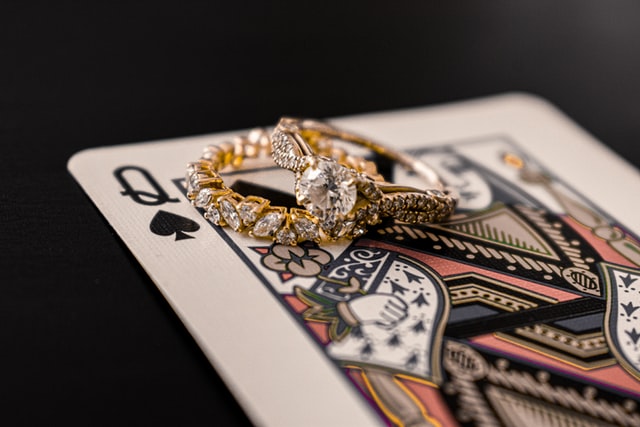
Most love stories seem to start the same way: two people meet, they spend some time together, they fall in love, and just like that, one person asks the other to spend the rest of their lives together. A beautiful engagement ring is presented and happily accepted in the process. They spend many months joyfully planning their perfect fairy tale wedding, deciding on seating arrangements for their guests, the colour scheme of the decor, the format of the ceremony, and whether red velvet is too ‘out there’ for the wedding cake flavour. Soon, the stress of planning for what is supposed to be the happiest day of their lives brings their incompatibilities into focus and leads to arguments. Future in-laws start to chime in with their well-intentioned advice. Someone gets the wedding blues, and coincidentally, their previous lover happens to be in town and wants to meet up for coffee and ‘get closure.’ More quarrels about family and finances follow. The arguments are no longer about the wedding at this point; they start to get personal. Some hurtful – but not entirely untrue – remarks are exchanged. One person finally says what has been on both of their minds for a while: “This relationship is over. I’m sorry for the way things turned out.”
Not every fallout of engaged couples is as dramatic as the above synopsis. Nonetheless, it can leave a significant impact on mental health. Aside from the emotional denouement, there are also logistical issues to take care of when calling off a wedding, including contacting the guests, returning or selling the wedding dress, trying to mitigate financial losses, cancelling the honeymoon. Additionally, there is the matter of deciding what to do with the engagement gift, mostly in the form of a ring is quite substantial in its monetary value, which will forever serve as a reminder of “what could have been.” What happens to the engagement gift if the marriage never takes place?

Can I start legal action against my ex-fiancé/fiancée for calling off the wedding?
Section 32(1) of the Ontario Marriage Act prohibits a lawsuit from being brought for a breach of promise to marry, or for damages resulting from the marriage failing to come into fruition. There are obvious public policy reasons as to why this became the law. If people could be sued for breaking off an engagement, this would create situations in which people enter into matrimonial relationships against their will due to fear of litigation, which would be especially precarious for those who are in a financially weaker position than their partner.
Can engagement gifts, such as a ring, be salvaged if the engagement is broken off? There are several steps in determining this: first of all, the gift should have been a conditional one where the gift was made in contemplation of marriage. An unconditional gift, such as gifts for birthdays, Christmas, a celebration of a milestone, or ‘just because’ gifts are arguably categorically different from an engagement ring, where there is a cultural notion that the gift is contingent on the marriage actually taking place. If the gift-giver cannot show that the engagement gift was conditional, the court will not order for the recipient to return the gift to the giver.
If the gift was conditional, the next question to determine is which party called off the engagement. In most cases, the party who initiated the separation will have to give up the gift.

The engagement was called off because I was “at fault.” Who can keep the engagement gift?
Section 33 of the Marriage Act specifically deals with this issue, wherein it states that when one person makes an engagement gift to the other, but the marriage never comes to fruition, the question of whether the gift-giver was at fault for breaking off the engagement is irrelevant in determining his or her right to recover the gift. It should be noted that being “at fault” is not synonymous with who called off the wedding. From jurisprudence, the term “at fault” seems to define who was morally and/or materially responsible for the reason behind the separation. The more important question appears to be who ended the engagement.
In McArthur v. Zaduk, [2001] O.J. No. 2284, two highly successful criminal lawyers fell in love after working as co-counsel on a murder trial. They purchased a house together and shared a significant investment portfolio in joint names before becoming engaged when Mr. Zaduk gave Ms. McArthur a diamond engagement ring valued at $27,000 for insurance purposes. Unfortunately, their marriage never took place, and they became involved in a lengthy litigation involving the division of property. Each party claimed that the broken engagement was the fault of the other. Therefore they had the right to keep the ring.
The issue of infidelity was crucial in determining who should keep the diamond ring. While Ms. McArthur wanted a marriage, Mr. Zaduk wanted to take things a little more slowly as he was still going through matrimonial litigation with his previous spouse. Because Mr. Zaduk did not commit to marriage, Ms. McArthur wished to continue to have sexual relations with other men and claimed that this was communicated between the parties. In contrast, Mr. Zaduk said he assumed that they were in a monogamous relationship when they moved in together. When Mr. Zaduk found out that Ms. McArthur had gone to Paris to see a male friend, he confronted her, and both parties confessed each of their infidelities throughout their relationship. Mr. Zaduk claimed that after this conversation, they agreed to remain sexually faithful to one another; Ms. McArthur denied this and said Mr. Zaduk condoned her affairs, which were a part of their relationship.
The parties worked on their relationship and soon became engaged. However, when Mr. Zaduk found out that Ms. McArthur had yet again seen her previous lover in Paris when she was on holiday with another woman, he became distraught and did not believe Ms. McArthur when she denied any sexual involvement. He broke off the engagement but did not ask Ms. McArthur to return the ring. He removed the ring from Ms. McArthur’s possession at some point, which did not take place until at least half a year passed by since the engagement faltered. Mr. Zaduk argued that although he was the one who called off the engagement, his action was “precipitated by Ms. McArthur’s breach of the condition of sexual fidelity that was a condition of their agreement to marry,” and that “by breaching a fundamental term of their agreement, it was really Ms. McArthur, who broke the engagement, and thus he should be entitled to the return of the ring”.
In her decision, Justice Mesbur wrote that courts historically looked at who broke off the engagement. She wrote that “if the donor did, he was not entitled to the return of the ring, and if the donee called off the engagement, she had to return it.” However, there were also cases where the court found that the engagement ring is an unconditional gift that does not have to be returned, regardless of the fault of either party, and that if the donor does not ask for the ring back immediately when the engagement is broken, he is estopped from demanding it later. (It is assumed that Justice Mesbur assigned the gender pronouns for the donor/donee for the sake of convenience in reading the decision, as most people who gift engagement rings are men). Although she found that there was no question that Mr. Zaduk expected his partner to be faithful, and that Ms. McArthur did not take sexual fidelity as seriously as Mr. Zaduk, there was no firm conditional agreement between the parties to marry to be sexually faithful to each other. For this reason, the court found that Mr. Zaduk broke the engagement and was not entitled to keep the diamond ring.
In Konopka v. O’Meara, 2011 ONSC 3229, the couple had initially planned on getting married and therefore, Mr. O’Meara gave a diamond ring to Ms. Konopka, and he took it back just before their separation. Mr. O’Meara’s position was that the ring was an engagement gift, and because the parties never married, he was entitled to keep the ring. Justice Sachs wrote that there is case law that supports the position that gifts that are conditional upon the contemplation of marriage must be returned if the marriage does not take place; but that in those cases, the court must consider who broke off the engagement. In quoting the case of McArthur above, the court ruled that because Mr. O’Meara was the one who ended the relationship, he was not entitled to have the ring returned to him.

Is there a time limit as to when a fiancé/fiancée can ask for the gift to be returned?
There is no set statutory ‘deadline’ as to how many days or weeks you have until the conditionality of the gift lapses. However, the following cases provide some interesting perspectives as to how the courts may determine whether the delay in request was justified.
In Newell v. Allen, 2012 ONSC 6681, Mr. Allen asked the court for an order to have Ms. Newell return to him a ring that he gave her in contemplation of marriage. Ms. Newell accepted the proposal in writing and confirmed the date of the proposal, as well as the receipt of the engagement gift. The parties separated about 7 years later when Ms. Newell told Mr. Allen that she wanted to terminate the relationship after they had an argument during a trip to Turks and Caicos. The marriage never took place. The main questions here were whether it was Ms. Newell who ended the engagement and whether the ring should be returned to Mr. Allen.
In her decision, Justice MacKinnon wrote that she was satisfied with the evidence that Ms. Newell was ‘the one who wanted out of the relationship and told the respondent so.’ Citing s. 33 of the Marriage Act, the court ruled that the provincial laws remove consideration of fault, and because Ms. Newell was the one who called off the engagement, she must return the ring to Mr. Allen.
In King v. Mann, 2020 ONSC 108, Mr. King proposed to Ms. Mann and gave her an engagement ring, which was given conditionally on marriage. Soon after they were engaged, Mr. King was arrested and removed from the couple’s home of two years for domestic violence. Criminal charges were laid. Even though he had to reside elsewhere under his bail conditions, the couple continued to have a relationship and attended couples counselling. Mr. King eventually pled guilty, and shortly after, the parties separated when Ms. Mann found out that Mr. King had a girlfriend.
Ms. Mann argued that because it was Mr. King’s fault that the marriage did not take place, she does not have to return the engagement ring. Justice Minnema cited a number of jurisprudence that ruled a delay in demanding an engagement ring back changes its character from a conditional to an unconditional gift. He further wrote that ‘a delay in requesting a return when it is clear the marriage is no longer proceeding could support a finding that the gift was unconditional.’ The court found that Mr. King had not mentioned the ring at all until his correspondence to Ms. Mann in April 2019, despite the fact it was clear to the parties in early 2017 that they would be separating. Despite this lengthy delay, Justice Minnema wrote that there would be no prejudice experienced by Ms. Mann if she were ordered to return the ring because she had not sold the ring and had no emotional attachment to it. The ring was a conditional gift on a marriage that did not come to fruition. Therefore Mr. King was ruled to be its rightful owner.
From these cases, it would be safe to say that if you are the gift-giver and you did not call off the engagement, the earlier you ask for the gift back, the better. Although the court may exercise its discretion in having the gift returned to the giver if the recipient would not suffer any prejudice because of its return, it would be prudent for the giver to ask for the gifts back as soon as the fallout becomes apparent, because the recipient might sell or develop an emotional attachment to the gift.

Closing Remarks on Engagement Gifts and Separation
Unfortunately, we sometimes face unexpected sharp turns in our lives. Few people anticipate for heartbreak when they plan for or accept a marriage proposal. But as the great British poet Alfred Tennyson once said, “it is better to have loved and lost than never to have loved at all” – not everyone has the fortune of being in love with someone so much to the point where you want to spend the rest of your life with them. We cherish those special memories, heal, and move on in life – and some people may choose to claim the engagement gift in the process, which is fair considering that many engagement gifts have high material worth due to their symbolic nature.
This blog post is not intended to be legal advice and was written for general education purposes. Consult with a legal professional at Kain & Ball to find out about your rights and responsibilities in matrimonial law.
The above information is NOT legal advice of any kind, and you should be sure to speak to a qualified family law lawyer about your specific situation pertaining to engagement gifts and separation. For more information, call us at 905-273-4588 or email us at contact@kainfamilylaw.com to book a free 30-minute consultation with one of our experienced family law lawyers at Kain & Ball Family Law.
